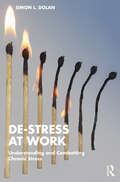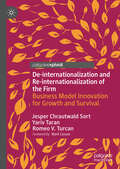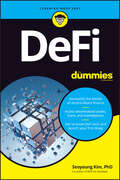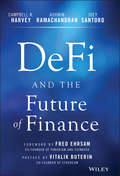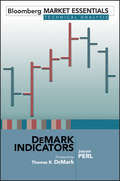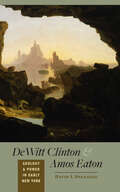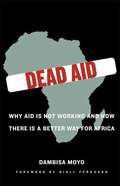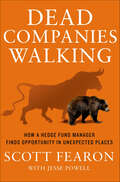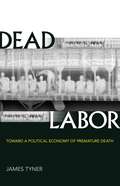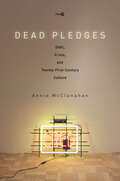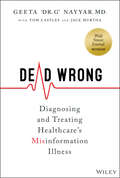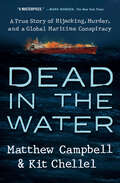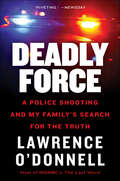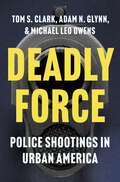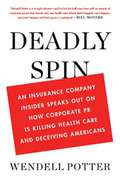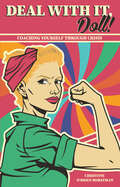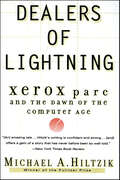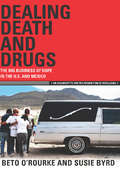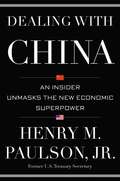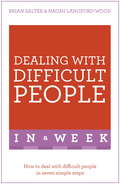- Table View
- List View
De-Stress at Work: Understanding and Combatting Chronic Stress
by Simon L. DolanBurn-out, excessive hours, office politics, handling complaints, isolated remote working, complex and inefficient processes – this book addresses the full complexities of chronic stress at work. It explains the potential for emotional and physical illness resulting from work, and importantly, presents ways in which occupational health and wellbeing can be enhanced through strengthening chronic stress diagnosis and promoting resilience. The latter is a win-win, for the worker, for the organization, and for society in general. Drawing on 40 years of research in collaboration with some of the best-known occupational stress gurus (including Cary Cooper, Susan Jackson, the late Ron Burke and Arie Shirom), Simon L. Dolan translates abstract concepts of chronic stress into practical guidance for enhancing resilience in a VUCA world. The ILO and many governments recognize stress as a principal cause of emerging physical and mental disease and one of the strongest determinants of high absenteeism, low morale and low productivity. While important advances have been made in the diagnosis of acute stress, the field of chronic stress in the workplace remains less clear. This book seeks to address this by presenting a wealth of diagnostic tools, including "The Stress Map". The text is brought to life for the reader by short vignettes in the form of anecdotes and stories. This book will be of particular interest to HR professionals, consultants, executive coaches, therapists and others who wish to help employees and clients better manage their own and others’ stress and to build resilience that leads to a more productive and healthier workforce.
De-internationalization and Re-internationalization of the Firm: Business Model Innovation for Growth and Survival
by Romeo V. Turcan Yariv Taran Jesper Chrautwald SortThis book marks the first attempt to explore de-internationalization and re-internationalization through business model innovation. Understanding how firms building on their de-internationalization experience can reconfigure their business models to pursue re-internationalization is vital to firms’ growth and survival. Combining sound theorizing and practical insights, this book conjectures that the relationship between de-internationalization and re-internationalization is best understood, theoretically and empirically, through the moderating effect of business model innovation. This book puts forward an international business-business model research program that will undoubtedly create more questions than answers, making it an exciting, thought-provoking avenue for future research and practice pondering in a VUCA world. This book is of great interest to practitioners, academics and students of business model innovation and international business, as well as those involved in strategic management for international businesses.
DeFi For Dummies
by Seoyoung KimGet to know the building blocks of a new economy The promise of decentralized finance (DeFi for those up on their financial lingo) as a disruptor to financial institutions makes it must-know for anyone involved in finance. DeFi For Dummies provides an easy-to-understand option for unraveling the past, present, and future of DeFi. Understand current DeFi applications, including how to build basic applications on the leading platforms, and get a look into the future&’s most promising new DeFi solutions. Staying ahead of the game is critical for finance professionals these days, and this Dummies guide makes it possible, with full coverage of how DeFi affects asset management, lending and borrowing, and investment markets. Wrap your mind around DeFi and start getting hands on, the Dummies way. Learn how the DeFi revolution started and where it&’s going Get insight into opportunities for getting started and building value with DeFi Discover the leading assets, exchanges, and marketplaces built on DeFi principles Create secure DeFi applications on established platformsThis book is great for current pros or active investors in the world of finance who need to get up to speed on the world of DeFi as quickly and clearly as possible.
DeFi and the Future of Finance
by Campbell R. Harvey Ashwin Ramachandran Joey SantoroDuring the Global Financial Crisis in 2008, our financial infrastructure failed. Governments bailed out the very institutions that let the economy down. This episode spurred a serious rethink of our financial system. Does it make any sense that it takes two days to settle a stock transaction? Why do retailers, operating on razor thin margins, have to pay 3% for every customer credit card swipe? Why does it take two days to transfer money from a bank account to a brokerage—or any other company? Why are savings rates miniscule or negative? Why is it so difficult for entrepreneurs to get financing at traditional banks? In DeFi and the Future of Finance, Campbell R. Harvey, Ashwin Ramachandran and Joey Santoro, introduce the new world of Decentralized Finance. The book argues that the current financial landscape is ripe for disruption and we are seeing, in real time, the reinvention of finance. The authors provide the reader with a clear assessment of the problems with the current financial system and how DeFi solves many of these problems. The essence of DeFi is that we interact with peers—there is no brick and mortar and all of the associated costs. Savings and lending are reinvented. Trading takes place with algorithms far removed from traditional brokerages. The book conducts a deep dive on some of the most innovative protocols such as Uniswap and Compound. Many of the companies featured in the book you might not have heard of—however, you will in the future. As with any new technology, there are a myriad of risks and the authors carefully catalogue these risks and assess which ones can be successfully mitigated. Ideally suited for people working in any part of the finance industry as well as financial policy makers, DeFi and the Future of Finance gives readers a vision of the future. The world of finance will fundamentally be changed over the coming decade. The book enables you to become part of the disruption – not the target of the disruption.
DeMark Indicators: Using The Most Powerful Indicators To Chart Success In The Markets + Website (Bloomberg Financial #40)
by Jason Perl“Long a secret weapon for the hedge-fund elite,” says Trader Monthly, the DeMark Indicators are now used by more than 35,000 traders. This book provides an easy-to-follow system for using the indicators to identify market turns as they happen. Author Jason Perl gives a concise introduction to thirty-nine of the DeMark Indicators, and then shows how to combine the indicators and time frames to achieve a higher probability of trading success. Thomas R. DeMark, the creator of the DeMark Indicators and one of the most well-respected practitioners of technical analysis wrote the Foreword to this book. This is the second book in the Bloomberg Market Essentials™: Technical Analysis series, which covers the key elements of the most widely used technical analysis tools. Silver Medal Winner, Investing Category, Axiom Business Book Awards (2009) Winner: Book Series Cover Design, The Bookbinders Guild of New York/2009 New York Book Show Awards
DeWitt Clinton and Amos Eaton: Geology and Power in Early New York
by David I. SpanagelHow did geology and politics inform scientific ideas and contribute to New York's prominence in the early nineteenth century?David I. Spanagel explores the origins of American geology and the culture that promoted it in nineteenth-century New York. Focusing on Amos Eaton, the educator and amateur scientist who founded the Rensselaer School, and DeWitt Clinton, the masterful politician who led the movement for the Erie Canal, Spanagel shows how a cluster of assumptions about the peculiar landscape and entrepreneurial spirit of New York came to define the Empire State. In so doing, he sheds light on a particularly innovative and fruitful period of interplay among science, politics, art, and literature in American history.
Deaconess-Glover Hospital (A)
by Steven J. Spear John KenagyChronicles the initial efforts to teach a health care organization to manage itself according to the principles of the Toyota Production System (TPS). Describes the decision and dilemmas that arose from the implementation experiment. Builds on Bowen and Spear's earlier research in industrial settings. They found that TPS is an integrated approach to designing, doing, and improving the work of individual people and of groups of people working collaboratively to produce and deliver goods, services, and information. The Deaconess-Glover Hospital project tested the efficacy of the TPS in a nonindustrial setting (i.e., health care) and also offered insight into how to convert an organization, managed by its existing management system to one managed by TPS principles. This case provides background on Deaconess-Glover Hospital and on the TPS teacher, John Kenagy. Describes how Kenagy observed the work at the hospital to understand the system. Given how Kenagy gathered data and based on what he directly observed, what should he recommend to managers about their next step?
Dead Aid: Why Aid Is Not Working and How There Is a Better Way for Africa
by Dambisa MoyoDebunking the current model of international aid promoted by both Hollywood celebrities and policy makers, Moyo offers a bold new road map for financing development of the world's poorest countries.
Dead Companies Walking: How a Hedge Fund Manager Finds Opportunity in Unexpected Places
by Scott Fearon Jesse PowellA hedge fund manager reveals how to spot a business on the verge of collapse—and how to profit from it—in this “surprisingly entertaining” guide (Publishers Weekly).Unlike most investors, who live in fear of failure, Scott Fearon actively seeks it out. He has earned millions of dollars for his hedge fund by shorting the stocks of businesses he believed were on their way to bankruptcy. In Dead Companies Walking, Fearon describes his methods for spotting these doomed businesses, and how they can be extremely profitable investments.In his experience, corporate managers routinely commit six common mistakes that can derail even the most promising companies: they learn from only the recent past; they rely too heavily on a formula for success; they misunderstand their target customers; they fall victim to the magical storytelling of a mania; they fail to adapt to tectonic shifts in their industry; and they are physically or emotionally removed from their companies’ operations.Fearon has interviewed thousands of executives across America, many of whom, unknowingly, were headed toward bankruptcy—from the Texas oil barons of the 80s to the tech wunderkinds of the late 90s to the flush real estate developers of the mid-2000s. Here, he explores recent examples like JC Penney, Herbalife, and Blockbuster Entertainment to help investors better predict the next booms and busts—and come out on top.
Dead Labor: Toward a Political Economy of Premature Death
by James TynerA groundbreaking consideration of death from capitalism, from the seventeenth to the twenty-first centuryFrom a 2013 Texas fertilizer plant explosion that killed fifteen people and injured 252 to a 2017 chemical disaster in the wake of Hurricane Harvey, we are confronted all too often with industrial accidents that reflect the underlying attitude of corporations toward the lives of laborers and others who live and work in their companies&’ shadows. Dead Labor takes seriously the myriad ways in which bodies are commodified and profits derived from premature death. In doing so it provides a unique perspective on our understanding how life and death drive the twenty-first-century global economy.James Tyner tracks a history from the 1600s through which premature death and mortality became something calculable, predictable, manageable, and even profitable. Drawing on a range of examples, including the criminalization of migrant labor, medical tourism, life insurance, and health care, he explores how today we can no longer presume that all bodies undergo the same processes of life, death, fertility, and mortality. He goes on to develop the concept of shared mortality among vulnerable populations and examines forms of capital exploitation that have emerged around death and the reproduction of labor. Positioned at the intersection of two fields—the political economy of labor and the philosophy of mortality—Dead Labor builds on Marx&’s notion that death (and truncated life) is a constant factor in the processes of labor. Considering premature death also as a biopolitical and bioeconomic concept, Tyner shows how racialized and gendered bodies are exposed to it in unbalanced ways within capitalism, and how bodies are then commodified, made surplus and redundant, and even disassembled in order to accumulate capital.
Dead Pledges: Debt, Crisis, and Twenty-First-Century Culture
by Annie McclanahanDead Pledges is the first book to explore the ways that U.S. culture--from novels and poems to photojournalism and horror movies--has responded to the collapse of the financialized consumer credit economy in 2008. Connecting debt theory to questions of cultural form, this book argues that artists, filmmakers, and writers have re-imagined what it means to owe and to own in a period when debt is what makes our economic lives possible. Encompassing both popular entertainment and avant-garde art, the post-crisis productions examined here help to map the landscape of contemporary debt: from foreclosure to credit scoring, student debt to securitized risk, microeconomic theory to anti-eviction activism. A searing critique of the ideology of debt, Dead Pledges dismantles the discourse of moral obligation so often invoked to make us repay. Debt is no longer a source of economic credibility, it contends, but is a system of dispossession that threatens the basic fabric of social life.
Dead Wrong: Diagnosing and Treating Healthcare's Misinformation Illness
by Geeta NayyarSave lives and improve public health by countering misinformation In Dead Wrong: Diagnosing and Treating Healthcare’s Misinformation Illness, a team of health misinformation experts delivers a first-hand account of the dangers posed by false narratives and snake oil in the face of deadly healthcare crises, like the COVID-19 pandemic. In the book, you’ll explore the challenges facing those who fight to restore truth to a place of primacy in the United States healthcare system, the strategies they use, and the lessons you can draw from their real-world stories. Through interviews with healthcare leaders on the frontlines of the COVID-19 pandemic and an intuitive discussion of contemporary academic research, the authors highlight issues of critical importance in the quest to bring accurate information to the American public. You’ll also find: An exhortation to healthcare professionals to take up the cause of countering misinformation as if their lives and livelihoods depend on it A compelling portrait of the seriousness of the information predicament in which we currently find ourselves Actionable, practical strategies for countering misinformation in today’s information ecosystem Perfect for clinicians, public health leaders, health-tech leaders, and health marketers, Dead Wrong will also earn a place in the libraries of media professionals and community leaders with an interest in keeping the American public healthy and vibrant.
Dead in the Water: A True Story of Hijacking, Murder, and a Global Maritime Conspiracy
by Matthew Campbell Kit Chellel&“A triumph of investigative journalism.&” —Tom Wright, New York Times bestselling coauthor of Billion Dollar Whale "Truly one of the most nail-biting, page-turning, terrifying true-crime books I've ever read." —Nick Bilton, New York Times bestselling author of American KingpinFrom award-winning journalists Matthew Campbell and Kit Chellel, the gripping, true-crime story of a notorious maritime hijacking at the heart of a massive conspiracy—and the unsolved murder that threatened to unravel it all.In July 2011, the oil tanker Brillante Virtuoso was drifting through the treacherous Gulf of Aden when a crew of pirates attacked and set her ablaze in a devastating explosion. But when David Mockett, a maritime surveyor working for Lloyd&’s of London, inspected the damaged vessel, he was left with more questions than answers. How had the pirates gotten aboard so easily? And if they wanted to steal the ship and bargain for its return, then why did they destroy it? The questions didn&’t add up—and Mockett would never answer them. Soon after his inspection, David Mockett was murdered. Dead in the Water is a shocking expose of the criminal inner workings of international shipping, told through the lens of the Brillante hijacking and its aftermath. Through first-hand accounts of those who lived it—from members of the ship&’s crew and witnesses to the attacks, to the ex-London detectives turned private investigators seeking to solve Mockett&’s murder and bring justice to his family—award-winning Bloomberg reporters Matthew Campbell and Kit Chellel piece together the astounding truth behind one of the most brazen financial frauds in history. The ambitious culmination of more than four years of reporting, Dead in the Water uncovers an intricate web of conspiracy amidst the lawless, old-world industry at the backbone of our new global economy.
Deadly Force: A Police Shooting and My Family's Search for the Truth
by Lawrence O'Donnell“An excellent case study of the Bowden killing” from the New York Times–bestselling author and host of MSNBC’s The Last Word with Lawrence O’Donnell (The Boston Globe).Featuring a new preface and afterword by the author, Deadly Force is the riveting story of a 1975 police shooting of an unarmed black man in Boston—one of the first to draw national headlines—and the dramatic investigation and court case that followed.On a rainy winter night, as James Bowden, Jr. left his mother’s Roxbury house in his Buick, two undercover officers sprang out, running toward his car. Shots were fired, and Bowden slumped over the wheel. Moments later, he was pronounced dead on arrival at a nearby hospital. The police argued that they had fired in self-defense, claiming that Bowden was an armed robbery suspect and that after they had ordered him to stop, he had fired a shot at one of them. And multiple internal investigations by the Boston Police Department exonerated the officers involved.But Patricia Bowden, James’s widow, knew better. “The truth will come out,” she said at her husband’s funeral. She sought a lawyer willing to take on the Boston Police Department and finally found one in Lawrence F. O’Donnell, the author’s father, a man whose past, unbeknownst to Patricia Bowden, made him the only man in town who could not refuse her case. O’Donnell embarked on a highly contentious three-year battle with the Boston Police Department to win justice for James Bowden.Timelier than ever, Deadly Force is a powerful indictment of police misconduct, a reminder of this issue’s long, tortured history and of how far we still have to go.
Deadly Force: Police Shootings in Urban America
by Tom S. Clark Michael Leo Owens Adam N. GlynnA groundbreaking study of when, where, and whom police shoot in America&’s largest cities Police shootings in America spark outrage and protest and raise questions about police use of lethal force. Yet despite the attention given to high-profile shootings, it is extremely difficult to draw wider conclusions about the frequency and outcomes of police gunfire because there is no systematic and centralized source of information on these incidents. This pioneering book draws on original data, compiled by the authors, to examine police shootings, both fatal and non-fatal, in hundreds of American cities. It documents racial disparities in shooting incidents and shows that the media spotlight on the most shocking fatal shootings tell only part of the story of police gunfire in our cities.The authors find that there are patterns in when, where, and whom the police shoot, and they present strong evidence of unjustifiable disparities. It&’s not just that young, unarmed Black men are disproportionately subjected to gunfire during encounters with police officers; there is also a disproportionate concentration of shootings in the places where most Black and Hispanic urbanites live, even accounting for violent crime rates and other factors. As a consequence, Black and Hispanic residents of large cities are disproportionately exposed to police gunfire, even when they are not themselves the targets of it. The authors offer other insights as well, exploring the connection between police department funding and rates of shootings, and considering the influence of a city&’s political leadership on police use of gunfire. It is only through a deeper understanding of police shootings, the authors argue, that we can reduce their incidence and make effective reform possible.
Deadly Spin: An Insurance Company Insider Speaks Out on How Corporate PR is Killing Health Care and Deceiving Americans
by Wendell PotterThat's how Wendell Potter introduced himself to a Senate committee in June 2009. He proceed to explain how insurance companies make promises they have no intention of keeping, how they flout regulations designed to protect consumers, and how they make it nearly impossible to understand information that the public needs. Potter quit his high-paid job as head of public relations at a major insurance corporation because he could no longer abide the routine practices of the insurance industry, policies that amounted to a death sentence for thousands of Americans every year. <p><p> In Deadly Spin, Potter takes readers behind the scenes of the insurance industry to show how a huge chunk of our absurd healthcare expenditures actually bankrolls a propaganda campaign and lobbying effort focused on protecting one thing: profits. With the unique vantage of both a whistleblower and a high-powered former insider, Potter moves beyond the healthcare crisis to show how public relations works, and how it has come to play a massive, often insidious role in our political process-and our lives. <p><p> This important and timely book tells Potter's remarkable personal story, but its larger goal is to explain how people like Potter, before his change of heart, can get the public to think and act in ways that benefit big corporations-and the Wall Street money managers who own them.
Deal Structure and Deal Terms
by Michael J. Roberts Howard H. StevensonDescribes the general principles of crafting financial deals around the provision of capital to entrepreneurial ventures. Discusses in more detail some of the specific aspects of venture capital term sheets.
Deal with It, Doll!: Coaching Yourself Through Crisis
by Christine O'Brien HorstmanWe could not have imagined with our clever ‘2020 vision’ slogans at the start of the new year that we would get a collective punch to the gut come spring. You may be going along We could not have imagined with our clever ‘2020 vision’ slogans at the start of the new year that we would get a collective punch to the gut come spring. You may be going along swimmingly in life and out of nowhere face your own crisis. You may have already had more challenges than seem fair for one person to endure. Whether you are still trying to process the pandemic or dealing with a crisis of your own creation, Deal with It, Doll! Coaching Yourself Through Crisis will leave you feeling less alone and so much stronger. Our collective health crisis inspired this book, but it’s built for the most common curveballs. The stuff many of us face personally and professionally in any given year. The changes most of us will deal with in our lifetimes. Parenting. Careers. Finances. Handling failures and fractures and managing our relationships. Health problems. All of it. Through each new phase in life, we have the opportunity to grow through change. When the literal and figurative masks come off, who are you, Doll? Who do you want to be and how are you going to make the most of your life, especially when things aren’t going your way? Your struggles, your shifts, your changes, and your challenges are creating the next version of your life in ways that may not yet make sense. Do not despair. Life is ever-changing and full of twists and turns.
Deal with NoNos: Increasing True Urgency and Managing People Who Resist Change
by John P. KotterA NoNo is more than a skeptic-he is, in essence, an urgency killer. He's always ready with ten reasons why the current situation is fine, why the problems and challenges others see don't exist, or why you need more data before acting. This chapter describes methods for preventing difficult people from derailing change.
DealShare: Social E-Commerce for the Indian Mass Market
by Krishna G. Palepu Malini SenLaunched in September 2018, e-retail startup DealShare has created a tech-enabled model for the Indian mass market that allows customers to buy together, save money on good quality goods, and at the same time have fun. It targets customers who are still getting used to the Internet for commerce and for whom big e-commerce players are not an ideal option. As DealShare transitions from a regional to a national company, the founders are at a crossroads. Until now, they have prioritized profitability at the unit economics level over growth. Now that they are confident that the DealShare concept can be profitable, should they relax their commitment to profitability and expand rapidly to preempt competition? Will the investments required and added complexity derail the company's success?
Dealers of Lightning: Xerox PARC and the Dawn of the Computer Age
by Michael A. HiltzikThe Pulitzer Prize-winner’s classic account of the legendary research lab that gave rise to the Digital Age.In the 1970s and ‘80s, Xerox Corporation brought together a brain-trust of engineering geniuses dubbed PARC (Palo Alto Research Center). This brilliant group created several monumental innovations that triggered a technological revolution, including the first personal computer, the laser printer, and the graphical interface (one of the main precursors of the Internet). And when these breakthroughs were rejected by the corporation, these determined inventors turned their ideas into empires that changed the world.Based on extensive interviews with the scientists, engineers, administrators, and executives who lived the story, Dealers of Lightning details PARC’s rise from humble beginnings to a hothouse for ideas. It also shows why Xerox was never able to grasp the cutting-edge innovations PARC delivered. Michael A. Hiltzik offers an unprecedented look at the ideas, the inventions, and the individuals that propelled Xerox PARC to the frontier of techno-history—and the corporate machinations that almost prevented it from achieving greatness.
Dealing Death and Drugs
by Beto O'Rourke Susie ByrdThe War on Drugs doesn't work. This became obvious to El Paso City Representatives Susie Byrd and Beto O'Rourke when they started to ask questions about why El Paso's sister city Ciudad Juárez has become the deadliest city in the world-8,000-plus deaths since January 1, 2008. Byrd and O'Rourke soon realized American drug use and United States' failed War on Drugs are at the core of problem. In Dealing Death and Drugs - a book written for the general reader - they explore the costs and consequences of marijuana prohibition. They argue that marijuana prohibition has created a black market so profitable that drug kingpins are billionaires and drug control doesn't stand a chance. Using Juárez as their focus, they describe the business model of drug trafficking and explain why this illicit system has led to the never-ending slaughter of human beings. Their position: the only rational alternative to the War on Drugs is to end to the current prohibition on marijuana."If Washington won't do anything different, if Mexico City won't do anything different, then it is up to us - the citizens of the border who understand the futility and tragedy of this current policy first hand - to lead the way." - from the AfterwordA portion of the proceeds from the sale of Dealing Death and Drugs will be donated to Centro Santa Catalina, a faith-based community in Ciudad Juárez, Mexico, founded in 1996 by Dominican Sisters for the spiritual, educational and economic empowerment of economically poor women and for the welfare of their families.
Dealing With China: An Insider Unmasks The New Economic Superpower
by Henry M. PaulsonDEALING WITH CHINA takes the reader behind closed doors to witness the creation and evolution and future of China's state-controlled capitalism.<P><P> Hank Paulson has dealt with China unlike any other foreigner. As head of Goldman Sachs, Paulson had a pivotal role in opening up China to private enterprise. Then, as Treasury secretary, he created the Strategic Economic Dialogue with what is now the world's second-largest economy. He negotiated with China on needed economic reforms, while safeguarding the teetering U.S. financial system. Over his career, Paulson has worked with scores of top Chinese leaders, including Xi Jinping, China's most powerful man in decades. <P> In DEALING WITH CHINA, Paulson draws on his unprecedented access to modern China's political and business elite, including its three most recent heads of state, to answer several key questions:<P> * How did China become an economic superpower so quickly?<P> * How does business really get done there?<P> * What are the best ways for Western business and political leaders to work with, compete with, and benefit from China?<P> * How can the U.S. negotiate with and influence China given its authoritarian rule, its massive environmental concerns, and its huge population's unrelenting demands for economic growth and security?<P> Written in the same anecdote-rich, page-turning style as Paulson's bestselling memoir, On the Brink, DEALING WITH CHINA is certain to become the classic and definitive examination of how to engage China's leaders as they build their economic superpower.<P> Chosen for Mark Zuckerberg's "A Year of Books"
Dealing With Difficult People In A Week: How To Deal With Difficult People In Seven Simple Steps (Teach Yourself In A Week Ser.)
by Brian Salter Naomi Langford-WoodThe ability to deal with difficult people is crucial to anyone who wants to advance their career. Written by Brian Salter and Naomi Langford-Wood, leading experts on dealing with difficult people as both coaches and practitioners, this book quickly teaches you the insider secrets you need to know to in order to overcome the barriers presented by difficult colleagues or customers.The highly motivational 'in a week' structure of the book provides seven straightforward chapters explaining the key points, and at the end there are optional questions to ensure you have taken it all in. There are also cartoons and diagrams throughout, to help make this book a more enjoyable and effective learning experience.So what are you waiting for? Let this book put you on the fast track to success!
